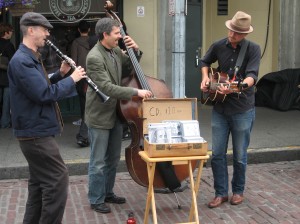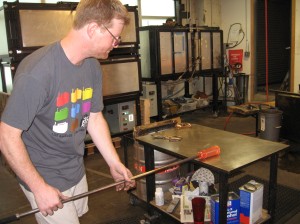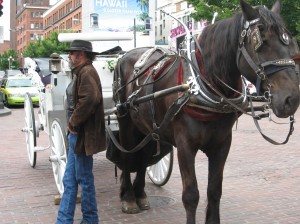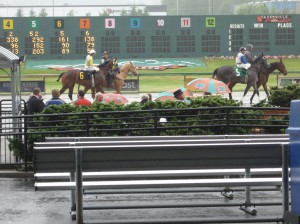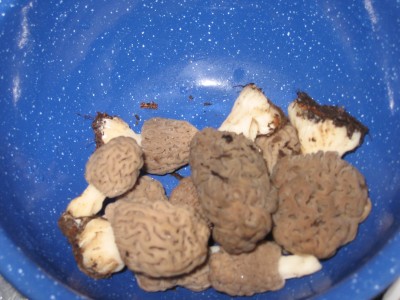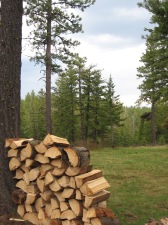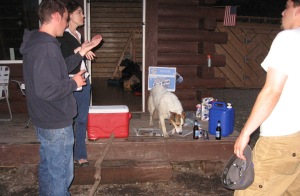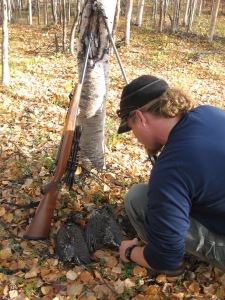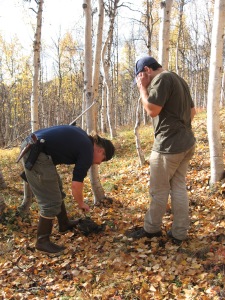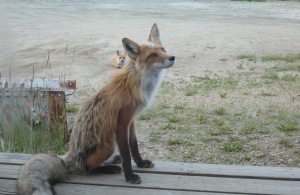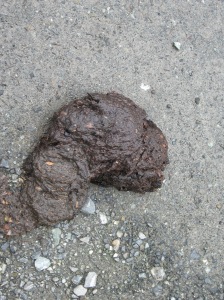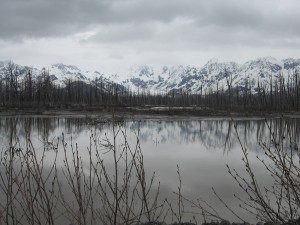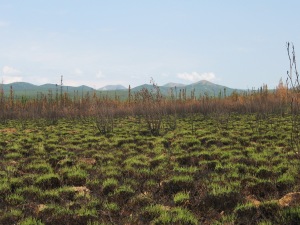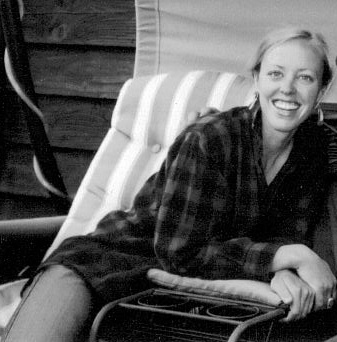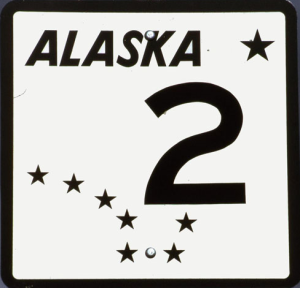
Well, I tried to move on. But then I decided to write just one last post about Alaska, because the subject matter feels appropriate for closure. I realized today, though, as I sat outside reading, that a journey doesn’t necessarily conclude at a certain time in space. It may come back in a person’s mind for years and years to come. And I guess that’s comforting.
We left Fairbanks last September, which seems like some time ago, given that it’s now June and I’m still writing about my life there. But sometimes distance is a prerequisite for writing about the myths we call memories, as Steinbeck might say. If we wrote about life’s happenings in the present, or shortly thereafter, the recollections would either be more true to the event, or lacking of a certain reflectivity. I guess you could call distance a double-edged sword. Although truth is a tough thing to pin down, in any case.
In saying “we left,” I mean me, Brian, my dad, and Brian’s dad. The whole gang. We caravanned from Fairbanks all the way to Livingston, Montana, where we set up camp in my parents’ garage apartment. Some of us felt like we were in a 80’s sitcom. The total distance came to 2,550 miles. Chump change, really, when you think of all the other lower 48 states we could have set as destinations. But, as anyone who has traveled the route would agree, it’s still a long haul, mainly because of road conditions and weather and the sparseness of modern-day conveniences, because of wildlife and highway construction and sometimes, even though the landscape is immensely beautiful, the monotony of it. But other elements–the threat of road pirates, wildlife, the sparseness of modern-day conveniences, the landscape, weather, and construction–keep it exciting. The trip of a lifetime, really.
Before we left Fairbanks we spent a good few days getting my dad acquainted with the place. I took him to the Oasis for an afternoon halibut melt and pint of beer, the Museum of the North (where he fell asleep during a movie–they call it museum lethargy, which is no testament to the quality of the place–it’s fascinating and people get tired), and to Nenana, an hour south of Fairbanks near Denali National Park, for the last of the season’s chinook and Arctic grayling fishing. We hired a guide to take us downriver on his jet boat, and were afforded one of the best and clearest views of Denali I’ve ever seen. As locals adoringly say, the Mountain was out. Although I’ve written about fishing and hunting a couple of times here, I don’t enjoy the sport for exerting dominance over something, or for proving that I have a constitutional right to it. I just enjoy stocking my freezer with a few good pounds of freshly-caught meat. In fact, there’s nothing like it. Sometimes I fantasize about having a freezer full of bison meat at home–even though I know the buffalo has a long and harried past in this country, since it once populated the Plains in absolute abundance before being decimated by systematic slaughter. To this day, though, it exists as the American symbol of sustenance.

Our guide, checking on the salmon. He took us on his jetboat into the park, where we had an unbelievable view of Denali.
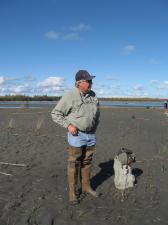
Dad's taking in the fresh air on the sandbars of the Nenana.
After the Fairbanks tour, and making rounds saying our goodbyes, we packed up our cabins and headed out. We made the drive down the Richardson, past Tenderfoot, where I first lived when I moved to Interior, and at Tok, about 200 miles from our departure point, stopped for a late lunch at Fast Eddy’s. Fast Eddy’s has the typical roadhouse menu, times ten. My go-to menu item is always the BLT–it’s tasty, it’s filling, and it’s cheap. (The Oasis, in Fairbanks, used to have a great BLT, but then they started putting it on garlic bread.) After going through customs and crossing the Canadian border, we arrived at our lodging for the night: the Alcan Motor Inn in Haines Junction, Yukon. I’m not so sure about Haines Junction, although we were incredibly grateful to have a stopping place for the night. It’s just that the girl who checked us in asked if me and my dad would be sharing a bed. And when we went to grab a couple beers at the bar behind the motel, a local guy, a few drinks in, gave us some local flavor with a few jokes.
Local Guy: You know, here in Canada, we have a region that’s known for growing really great potatoes–Prince Edward Islands.
Me: [Nodding my head like I know.]
Local Guy: There in the States you have a place known for it’s potatoes, too. What’s the name of that place?
Me: Oh. Yeah. Idaho. (I might have even raised my hand.) Idaho. (Pumping my head, then.)
Local Guy: Oh yeah? You da hoe, huh? Then I da pimp.
He got me. I was suckered into his joke. And I’d heard it numerous times before. Mainly I felt duped because I momentarily visualized this guy as my pimp, and I knew he hadn’t bathed, or washed the sweatpants he was wearing, in many days. I guess my dad’s paternal instinct kicked in, then, because he ushered me out of the bar and drove to a nearby gas station for sandwiches.
The ALCAN, a highway that connects Alaska to the contiguous through Canada, was constructed during FDR’s presidency as Japanese military threats loomed during World War Two. Pearl Harbor had already been attacked, as well as the Aleutian Islands, and the government deemed a land route necessary for military purposes. Officially, the highway begins in Dawson Creek, B.C. and ends in Delta Junction, passing through a good portion of the Yukon Territories.
After leaving Haines Junction, we became vigilant of the road pirates. We never saw any, but that’s not to say they’re not out there. They operate by positioning themselves on the tops of hills, rolling large tractor trailer tires onto the road that damage your vehicle, and then pillaging you. It’s a frightening phenomenon, and we were lucky to not have become targets. We landed safely at the Northern Rockies Lodge at Muncho Lake that night, where the rain and fog had settled in among the huge log structure of the lodge, which is situated in a milieu of spruce and birch, in the middle of nowhere, on the banks of a jade-colored lake. It’s a place I would someday like to go back to–they stage fishing trips and take guests on float planes to remote cabins. And they have a decent restaurant, mainly with typical German fare, including wienerschnitzel and spaetzle.
The next morning the rain came down in sheets and we jaunted down the highway along the Laird River, past herds of bison and a lone caribou. The buffalo were incredible in their numbers–we must have seen at least half the animal’s population in the province. That night we made it to Dawson Creek where the ALCAN officially begins, and for us, where it ended, and stayed the night at the Best Western, which adjoins itself to a Tony Roma’s restaurant, where we ate. It was there where we found ourselves on the brink of civilization. I don’t remember much of our trip past that point. I guess there comes a time in a journey, sometimes even before it officially comes to a close, where it seems to end anyway. I remember stopping at a large gas station, passing through seemingly endless construction zones in Edmonton, and listening to our second audio book by Dean Koontz.
Our last stopover was Lethbridge, Alberta–a town with a unique mix of agricultural roots and a vaguely cosmopolitan feel. The name of the place where we stayed escapes me, which is unfortunate, because it was a nice, somewhat European-esque hotel, but I do remember that we walked to the water tower for drinks and a small bite to eat, and the place was swanky with an impressive menu and 360-degree views of the surrounding landscape.
When we came into the States the next day we traveled south on 15 and I expected complete culture shock and a chaos typical of major roadways in the lower 48. But the truth is, we’d crossed a somewhat ambivalent border (politics aside), and neither landscape nor people seemed that different. There were still large swaths of unoccupied land, although much of it was farmed, and the road signs were still embedded with rural, wooden posts. I imagine that people, in the part of the country we were in, anyway, still valued independence and the land and fostered a certain spiritedness.
It wasn’t until we traveled to New Mexico, a couple months later via Denver, that I had a true sense of being back in the States. Billboards and heavy traffic and eight-lane divided highways, peppered with outlet malls, reminded me of the consumerism and constant development that this country’s known for. In quoting Steinbeck again, it’s odd how progress often looks like destruction. But I also saw signs of diversity and opportunity. We ate at an Indian restaurant in a nondescript Denver strip mall and the place was packed with Indian and white people alike. A belly dancer entertained customers at their tables and offered to give me a lesson, right then and there. But I wasn’t up for that kind of immersion quite yet, anyway. When we made it into New Mexico, on our way to visit friends and family, we stopped briefly in Taos, where we had lunch at Graham’s Grille, and I had decadent huevos rancheros with blue corn tortillas and avocado and salsa, and there was evidence of the trademark green chile everywhere. Toas may be a tourist mecca, but it has a fascinating mix of people–from the native Pueblo to the old Mexicans to the second and third generation New Mexicans to the white transplants.
In traveling, a person reinvigorates the senses, and the world seems new again. It’s why I’ve always loved going different places. But at the same time, I’ve always envied people who have roots, who’ve lived in the same place their whole lives and seem to know that place inside and out–the landscape, the people, the traditions. But that’s not how my life panned out, and I suppose people in this country have a natural inclination for travel anyway, since we all, at some point, came from somewhere else, seeking new opportunities and direction.

The famous Albuquerque Balloon Festival
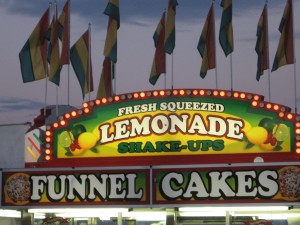
It doesn't get much more American than this.

Green chiles, again.

And the mariachi band.

